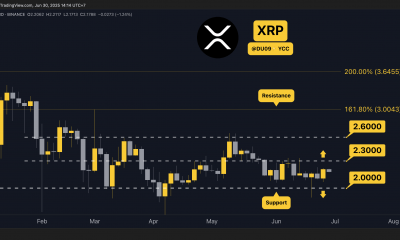Cryptocurrency
Members of banks for international settlements will start checking

Members of the Bank for International Settlements (BIS) will start checking companies engaged in issuing stablecoins. This is reported in the organization’s plans for 2023. The new project, called Project Pyxtrial, will track corporate balances of stablecoins issuers.
The organization argues that most central banks lack the tools to “systematically monitor stablecoins and prevent asset-liability mismatches.” The project will explore various technological tools that can help supervisors and regulators create policy frameworks based on integrated data, the Bank for International Settlements added. Exact timelines for developing the monitoring system were not disclosed, but the London Center, part of the BIS Innovation Hub, will work on the project.
The BIS proposed the creation of a supervisory body for the stablecoins market back in 2020. At the time, the organization argued that as private stablecoins develop, regulators should consider creating “embedded oversight” in such asset systems. By “built-in oversight,” BIS experts mean automatic monitoring of regulatory compliance. This requires access to read a distributed registry. In particular, one of the key options for using such supervision could be an audit of the security of stablecoins, the organization believes.
At the same time, the Bank for International Settlements is in no hurry to create a regulatory norm for digital currencies of central banks (CBDC). As the editorial board wrote earlier, the organization doubts the prospects of CBDC. Sicily Skingsley, head of Hub for Innovation, previously said that even with digital public currencies, we should not expect financial markets to be “fully interconnected. They believe that digitalization of economies will do nothing to solve the geopolitical issue.
The full conversion of economies to digital currencies also opens up new challenges. For example, it is unclear how the authorities intend to maintain confidence in the monetary system while completely abandoning traditional paper money, Skingsley acknowledged.
Earlier, we reported that a court dismissed a lawsuit against Coinbase over the sale of unregistered securities.
Cryptocurrency
MORI COIN (MORI) Explodes by 300% in a Day: The New Crypto Sensation or a Downright Scam?

TL;DR
- The price of the Solana-based meme coin skyrocketed after drawing massive attention across social media platforms.
- One trader turned $290 into $1.6 million but still holds the position – risky, as the valuation could crash just as fast. Moreover, the token lacks real utility, making the rally purely speculative.
The Impressive Jump
It’s a familiar sight in the meme coin sector: a token suddenly skyrocketing by double or even triple digits in a short period. Today’s best performer is the lesser-known MORI COIN (MORI), whose price has exploded by over 300% on a 24-hour scale, while its market capitalization has surged past $150 million.
The Solana-based asset is one of the top-trending cryptocurrencies on CoinGecko, and among the most talked-about on the social media platform X. Its rally is driven by considerable interest from traders.
Earlier today, Stalkchain estimated that MORI headed north due to a wave of fresh wallets that were “aggressively buying in.”
While the meme coin’s rally is undoubtedly impressive, investors contemplating whether to jump on the bandwagon should keep some important notes in mind. For one, MORI was launched by a notorious Russian YouTuber (with over 3.2 million followers) who allegedly runs a massive Darknet marketplace.
That said, many X users labeled the asset as one of the biggest scams in the crypto space. David Crypto Scam Hunter supports that thesis, albeit suggesting that further gains in the future are not out of the question.
⚠️⛔️$MORI
One of the biggest scams rn
It might go higher – why not?
But no doubt… it’s a massive scam
Update coming soon. https://t.co/idZMnn6MdK pic.twitter.com/u2BOo496HR
— David Crypto Scam Hunter (@CryptoScamHuntO) June 30, 2025
Besides its purported connection to a Dark Web marketplace, MORI lacks intrinsic value, and its price is driven purely by hype, speculation, and insider promotion. There’s also limited transparency regarding the token’s supply, developer wallets, or whale distributions. Its marketing strategy mirrors previous pump-and-dump schemes, which have caused crucial losses to investors in the past.
Early Birds Make Fortunes
Scam or not, MORI (just like many other meme coin that recorded massive gains in its early days) allowed savvy traders to generate substantial profits.
The X account, DexCheck AI, revealed the case of one person (or entity) who turned $290 into $1.6 million by investing in the token. As of this writing, the wallet still holds the position. This is a risky move, as a potential crash could wipe out the paper profits entirely. However, MORI’s bull run might still be in its early stages, and the fortune could potentially grow even larger in the coming days.
Binance Free $600 (CryptoPotato Exclusive): Use this link to register a new account and receive $600 exclusive welcome offer on Binance (full details).
LIMITED OFFER for CryptoPotato readers at Bybit: Use this link to register and open a $500 FREE position on any coin!
Cryptocurrency
Bitcoin Taps $109K While Arbitrum Explodes by 15%: Market Watch

Bitcoin is starting the week with a test of the $108,000 level. The primary cryptocurrency also attempted to break above this level during the weekend but failed to do so.
Meanwhile, certain altcoins are charting notable gains, while the majority of the market is trading in the green.
Bitcoin Price Testing $108K
Bitcoin is seemingly attempting to break above the $108,000 level – something that it’s been trying to do for quite a while now. Unfortunately, at least up until this moment, the cryptocurrency has been unsuccessful in doing so. Today, however, it almost reached $109,000 before the sellers took the stage.
The most recent attempt comes amid news that the Japanese comapny MetaPlanet has made yet another Bitcoin buy worth some $108,000 and amid growing expectations that Michael’s Saylor’s Strategy will announce its own strategic purchase.
At the time of this writing, BTC’s price retraced to around $107,700 and it’s interesting to see if it will finally be able to break above this relatively narrow range that it’s been trading within for the past week.
Altcoins Mixed, ARB Rallies
Today’s heatmap is rather mixed with the majority of altcoins trading mostly flat. However, there’s an obvious exceeption to it all in the face of Arbitrum’s ARB token, that’s up 15% on the day. In fact, it soared by around 20% but has since retraced a little bit.
As CryptoPotato reported, the primary reason behind Arbitrum’s surge today is that there are some rumors that the popular retail-oriented trading app Robinhood might use the network to build its own protocol. Hours ago, the fintech comapny revealed that it will be conducting a fireside chat with Ethereum’s founder Vitalik Buterin and the CSO of Arbitrum’s Onchain Labs – A.J. Warner.
Other than ARB, the majority of other altcoins are trading relatively flat with PENGU, OP, and HYPE up by 3.5% in the past 24 hours – slightly ahead of the curve.
KAIA, Pi Network (PI), and Mantle (MNT), on the other hand, are the worst performers, down 6.1%, 5.4%, and 5.7%, respectively.
Binance Free $600 (CryptoPotato Exclusive): Use this link to register a new account and receive $600 exclusive welcome offer on Binance (full details).
LIMITED OFFER for CryptoPotato readers at Bybit: Use this link to register and open a $500 FREE position on any coin!
Disclaimer: Information found on CryptoPotato is those of writers quoted. It does not represent the opinions of CryptoPotato on whether to buy, sell, or hold any investments. You are advised to conduct your own research before making any investment decisions. Use provided information at your own risk. See Disclaimer for more information.
Cryptocurrency charts by TradingView.
Cryptocurrency
Why is the Arbitrum (ARB) Price up Today?

TL;DR
- ARB spiked to a two-week high following a combination of rumors and positive factors.
- While some analysts believe it may rally even further in the short term, the RSI’s ratio of over 80 suggests an incoming pullback could be on the horizon.
The Top Performer
ARB, the native token of Arbitrum, has been the best-performing cryptocurrency from the top 100 club over the past 24 hours. Its price is up an impressive 20% for that timeframe, reaching $0.38 (per CoinGecko’s data).
Its market capitalization shot to almost $2 billion, thus flipping Official Trump (TRUMP), Render (RENDER), Filecoin (FIL), Algorand (ALGO), and other well-known altcoins. Currently, ARB is the 60th-largest cryptocurrency.
The most likely reason for the uptrend is the rumor that Robinhood might team up with Arbitrum to build a blockchain platform that enables European investors to trade US stocks. Just a few hours ago, the fintech company revealed it will conduct a “fireside chat” with Ethereum’s founder Vitalik Buterin and A.J. Warner (CSO of Onchain Labs – an entity that stands behind Arbitrum).
Another factor that may have positively impacted ARB’s valuation is the further support coming from Binance. The world’s leading crypto exchange recently announced it will add the trading pair ARB/USDC to its Trading Bots section, although this one is more on the speculative side and not as likely to have fueled any meaningful price change.
More Gains on the Way?
ARB’s surge has garnered attention across the cryptocurrency industry, with several analysts suggesting it may signal the start of a significant bullish trend. One X user envisioned a potential breakout of a certain trendline, which could send the price to $0.50 and beyond.
Crypto TA King thinks “ARB looks amazing” at its current levels, saying they will “take entry” if the valuation drops to the $0.32-$0.34 range.
Despite the prevailing optimism, investors should exercise caution because the token’s Relative Strength Index (RSI) has spiked above 80. This is generally viewed as bearish territory, as it indicates that the price has increased too rapidly in a short period and may be poised for a short-term correction.
Binance Free $600 (CryptoPotato Exclusive): Use this link to register a new account and receive $600 exclusive welcome offer on Binance (full details).
LIMITED OFFER for CryptoPotato readers at Bybit: Use this link to register and open a $500 FREE position on any coin!

 Forex3 years ago
Forex3 years agoForex Today: the dollar is gaining strength amid gloomy sentiment at the start of the Fed’s week

 Forex3 years ago
Forex3 years agoUnbiased review of Pocket Option broker

 Forex3 years ago
Forex3 years agoDollar to pound sterling exchange rate today: Pound plummeted to its lowest since 1985

 Forex3 years ago
Forex3 years agoHow is the Australian dollar doing today?

 Cryptocurrency3 years ago
Cryptocurrency3 years agoWhat happened in the crypto market – current events today

 World3 years ago
World3 years agoWhy are modern video games an art form?

 Commodities3 years ago
Commodities3 years agoCopper continues to fall in price on expectations of lower demand in China

 Economy3 years ago
Economy3 years agoCrude oil tankers double in price due to EU anti-Russian sanctions



























